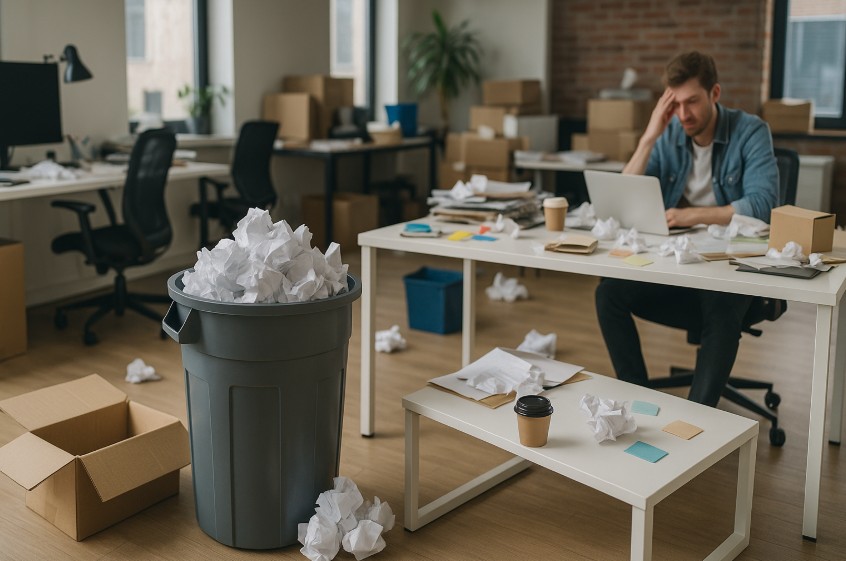Table of Contents
ToggleWhat does “waste” really mean in the world of startups? Is it just about money lost through failed experiments or unprofitable marketing campaigns? Or does it extend to something much deeper, inefficiency, unused resources, and a careless attitude towards sustainability?
Many new businesses focus heavily on speed, innovation, and disruption but fail to see how hidden forms of waste silently drain their growth potential.
While large corporations often have structured systems for efficiency, startups operate in a fast-paced environment where every second, square foot, and piece of equipment counts.
Yet, waste, whether material, cultural, or operational, creeps into even the leanest teams. Understanding where it originates and how to eliminate it can save significant time, money, and resources in the long run.
Where Does Waste Begin in a Startup?
Every startup begins with passion and purpose, but in the rush to grow, inefficiencies slowly start to appear. It might begin with over-ordering supplies, renting more office space than needed, or taking on projects without measuring their long-term value. Over time, these small inefficiencies evolve into deeply rooted waste that impacts finances, productivity, and team morale.
Recognising where waste originates is the first step toward controlling it. It starts with asking hard questions: Are we managing our resources responsibly? Are we optimising our workspace? Are our processes helping or hindering our growth? Once these questions are addressed honestly, the path toward a leaner, more sustainable startup becomes clearer.
The Hidden Cost of Waste in Startup Culture
1. Material Waste: The Silent Expense of Rapid Experimentation

In startup culture, the phrase “move fast and break things” is often celebrated. But this mentality comes with a hidden cost when physical and digital resources are treated as disposable. Hardware startups, for example, may discard multiple prototypes before perfecting one product, while digital-first companies often replace functioning devices simply because newer models appear.
Office supplies, promotional merchandise, outdated electronics, and unused furniture quickly pile up, occupying valuable space and demanding disposal costs. Over time, these items form a layer of invisible overhead that not only consumes storage but also money that could have been invested in core development or marketing.
A responsible approach to waste starts with awareness. Teams should track how often they replace devices, assess if items can be reused or donated, and avoid over-ordering office consumables. Even the smallest reductions in material waste can lead to measurable cost savings.
2. Spatial Waste: The Cost of Unused Space
Office space is often one of the most expensive investments for a startup. Ironically, many startups pay for large offices or co-working areas that remain underutilized. Empty meeting rooms, vacant desks, and forgotten storage corners all represent money quietly slipping away each month.
With hybrid work now common, startups can rethink their space allocation by introducing flexible desk setups or adopting smaller, more efficient offices. Every unused square metre carries rent, electricity, and maintenance costs that add no value to the business.
| Space Type | Common Inefficiency | Possible Solution |
| Meeting Rooms | Booked but rarely used | Track room utilisation and downsize |
| Storage Areas | Filled with unused materials | Audit and clear regularly |
| Workstations | Vacant due to hybrid work | Adopt hot-desking or shared seating |
This is where decluttering becomes more than an aesthetic choice, it’s a financial and operational one. Many London-based startups now opt for professional rubbish removal services such as Quick Wasters to responsibly clear out unused items and reclaim valuable workspace for active projects.
3. Human Waste: When Talent Isn’t Used Effectively
People are the heart of every startup, yet human potential is often the most wasted resource. Startups, especially in early stages, tend to assign overlapping roles or fail to define responsibilities clearly. Employees spend time juggling too many unrelated tasks or duplicating work done by others.
This inefficiency doesn’t just affect productivity, it also impacts morale. When skilled individuals spend their energy on low-impact activities or administrative tasks, they lose motivation and creativity.
Startups must regularly evaluate job roles and workflows to ensure that everyone’s time and expertise align with the company’s priorities. Clear communication, proper delegation, and workflow automation can go a long way in reducing this human form of waste.
4. Process Waste: The Slow Creep of Inefficiency

As startups grow, the simple systems that once worked often become complicated. Processes designed for a three-person team may no longer suit a thirty-person company. Unnecessary approval steps, outdated software tools, or duplicated communication channels lead to time loss and frustration.
Unlike visible material waste, process waste hides behind “business as usual.” A team may spend weeks fixing avoidable bugs, rewriting old code, or chasing approvals that could have been automated. By mapping out each process, from onboarding to product delivery, leaders can identify where time and effort are being wasted and redesign workflows to focus only on activities that directly add value.
Continuous process improvement isn’t a luxury; it’s a necessity in startup life. Every inefficiency compounds over time and delays growth milestones that investors and customers expect.
5. Cultural Waste: Habits That Drain Energy and Vision
Perhaps the most damaging form of waste lies in company culture. A culture that glorifies overwork, discourages rest, and hides mistakes breeds inefficiency in the long run. Burnt-out teams make slower decisions, repeat errors, and lose focus on innovation.
Similarly, when startups chase vanity metrics, such as social media followers or flashy partnerships, over sustainable growth indicators, they waste both strategic direction and valuable momentum. Healthy cultures encourage thoughtful experimentation, accountability, and rest. They recognise that long-term success depends on deliberate, meaningful effort, not endless hustle.
What Is the Real Price of Waste in Startups?
Waste, in all its forms, drains more than just money. It consumes creativity, energy, and the trust that teams have in their vision. The financial impact of hidden waste often shows up in small, recurring losses: storage costs for unused inventory, time spent fixing preventable errors, or staff turnover from burnout.
Over time, these “minor” inefficiencies create a cumulative drag that can determine whether a startup thrives or collapses under its own weight. Sustainable success depends not just on innovation, but on discipline, the ability to identify and remove what doesn’t serve the mission.
Building a Lean, Sustainable Startup
The solution begins with transparency. Regular audits of resources, space, and workflows can reveal where waste is hiding. Encouraging employees to question processes, suggest improvements, and think sustainably fosters ownership and accountability.
Founders must shift from the mindset of constant expansion to conscious efficiency. This doesn’t mean slowing down innovation, it means refining it, ensuring that every resource, tool, and hour of effort contributes meaningfully to growth.
By addressing hidden waste, whether in the form of cluttered offices, inefficient systems, or unhealthy work habits, startups can build a culture of clarity, agility, and responsibility that truly reflects their entrepreneurial spirit.
Final Thoughts
Waste is not always obvious. It lurks in the corners of unused space, inside bloated workflows, and within unsustainable habits. Recognising and tackling it is one of the smartest moves a startup can make.
By valuing every resource, human, material, and cultural, startups not only cut unnecessary costs but also lay the groundwork for scalable, responsible growth. The hidden cost of waste is high, but with the right awareness and action, it can be transformed into one of the greatest sources of strength.




